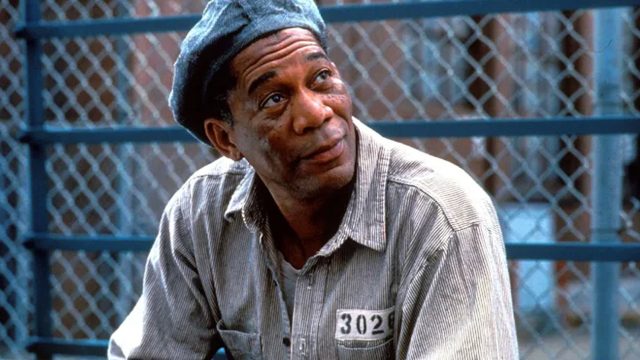That Morgan Freeman is technically miscast as Red in The Shawshank Redemption is a hill I will die on, as is the absolute brilliance of his performance regardless of miscasting. The story starts in Maine in the 1930s, and Red’s race is never an issue despite his being basically the only black person in the prison. It’s definitely something that would have been more of an issue. I do like the throwaway line that he’s Irish inasmuch as a line that’s probably literal in the book is just funny in the movie. Freeman’s deadpan delivery is part of the best of it. It’s why his miscasting is fine by me.
It’s true, though, that King suffers frequently from miscasting of his characters. Sometimes, you get situations like Freeman as Red. Sometimes—speaking of hills I’ll die on—you get Jack Nicholson in The Shining, where the miscasting creates an entirely different character from the one that appears in the book. Some people like the new version better, of course, but it doesn’t change that Morgan Freeman elevates Red but still fulfills the fundamental spirit of the character. Jack Nicholson . . . doesn’t.
Part of the problem may be King’s combination of incredible popularity and incredible list of works. King is, of course, so prolific that Richard Bachman existed in part so he could publish more of what he’d written without wearing out his brand. There is just a lot of Stephen King to adapt, and people really like Stephen King, so it’s hardly a surprise that they won’t all be winners. In a lower level, lesser known moment of snarkiness, there’s King’s own comment that the protagonist of Misery may or may not have been him but definitely wasn’t James Caan. Which is not to say that Caan necessarily does a bad job, but it does show that casting can be personal.
Another part may be that a lot of King movies are cast with either popular or cheap performers. The very first movie adaptation of one of his works, Carrie, stars the then incredibly successful John Travolta, who apparently auditioned while on lunch break from filming Welcome Back Kotter. Some adaptations have deliberately cast nobodies; others have been “dollar babies,” the films made by film students to whom he sold rights for a dollar. I’d imagine most of the dollar babies have casts of whoever their directors could get. Meanwhile, Arnold Schwarzenegger stars in The Running Man because people like Arnold Schwarzenegger.
Not to be too snobbish, but another issue is that many adaptations simply don’t understand the works they’re adapting, or make choices based on what will be popular rather than what will be good for the story. This may also be why so many King adaptations are simply not good. Look at Lawnmower Man, such a bad adaptation that he sued to have his name taken off it. It doesn’t matter who you cast if the character only occasionally brushes up against its original version anyway. Or the person responsible for casting the movie may have a different perception of the original work which means that casting someone else is the right call because it fits their version better.
Now, sometimes, again, it works. Corin Nemec is a surprising choice for Harold Lauder and is good at the role anyway. You wouldn’t think Bronson Pinchot could manage Craig Toomy, and he looks nothing like the character as described, but there it is. Christopher Walken is an almost perverse choice for the ordinary, wholesome Johnny Smith, but he’s one of the reasons it’s one of the best King adaptations ever made. Tom Hanks is arguably all wrong for Paul Edgecomb. I’m not sure how we’ll handle Zac Efron as Andy McGee, but I guess we’ll all find out. We lucked into good performances from people who never should’ve been cast. It’s just strange how often that happens to Stephen King.
Finance more hot takes like these by supporting my Patreon or Ko-fi!

